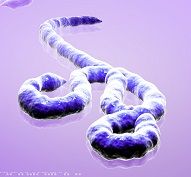Article
Ebola: Quarantined Nurse Leaves NJ
Author(s):
A nurse from Maine who treated Ebola patients in West Africa and has been quarantined since Friday at University Hospital in Newark, NJ is on her way home. Kaci Hickox was released and allowed to return to Fort Kent, ME, after doctors at University Hospital determined she does not have an active case of Ebola. Her quarantine will continue at home. Her release, announced by the office of NJ Gov. Chris Christie ends an embarrassing episode but does not settle debate about whether the mandatory quarantines for those returning from treating patients in the Ebola hot zone is necessary.

A nurse from Maine who treated Ebola patients in West Africa and has been quarantined since Friday at University Hospital in Newark, NJ is one her way home. Kaci Hickox was released and allowed to return to Fort Kent, ME, after doctors at University Hospital determined she does not have an active case of Ebola. Her quarantine will continue at home.
According to NJ officials, Hickox will not use any public transportation on her way home
Her release, announced by the office of NJ Gov. Chris Christie ends an embarrassing episode but does not settle debate about whether the mandatory quarantines for those returning from treating patients in the Ebola hot zone are necessary.
Fox News reports that the Pentagon is weighing whether soldiers returning setting up treatment facilities in Liberia should be quarantined.
The Obama administration has not recommended that the quarantines become a national policy.
A big issue is whether being subjected to quarantines on their return will stop health care workers from volunteering to go to West Africa to treat patients where the virus is raging.
Hickox had complained publicly about her quarantine, saying she was “being treated like a criminal” and threatening a lawsuit. She was detained because she had a fever, and had been working in Sierra Leone with Doctors without Borders treating Ebola patients.
According to Hickox’s boyfriend Ted Wilbur, a nursing student at the University of Maine, Hickox described the hospital’s isolation unit as “15-yard- long tent with a plastic sheeted floor in the parking lot” and that she had to use a bucket as a toilet and had no shower.
That was a sharp contrast to conditions in which NJ’s first Ebola quarantine case, NBC medical editor Nancy Snyder, had to put up with. Snyderman was confined to her Princeton home after she violated a voluntary agreement to stay there for 21 days. She was considered at risk of having the Ebola virusafter a trip to West Africa because a cameraman she traveled with was hospitalized with Ebola. Her quarantine ended Oct. 22.
This morning, in a statement from NJ Gov. Chris Christie’s office announcing Hickox’s release, the governor’s spokesman defended the nurse’s accommodations at University Hospital, calling the isolation unit an “advanced tenting system that was recently toured and evaluated by the CDC.”
Further, the spokesman wrote,“ While in isolation, every effort was made to insure that she remained comfortable with access to a computer, cell phone, reading material and nourishment of choice.”
Christie and New York Gov. Andrew Cuomo announced Friday that they would quarantine all health care workers and travelers who had had contact with Ebola patients in three West African nations: Sierra Leone, Liberia and Guinea. Cuomo later modified his policy to allow such travelers to be quarantined at home. Illinois has since adopted a quarantine policy for travelers from those countries arriving at Chicago’s O’Hare International Airport. Illinois Gov. Pat Quinn said “This protective measure is too important to be voluntary,” and added that though there are no confirmed cases of Ebola in Illinois, “We will continue to take every safeguard necessary to protect first responders, health care workers and the people of Illinois.”
The 3 states' quarantine policies are far more restrictive than those recommended by the US Centers for Disease Control and Prevention (CDC).
The CDC’s recommendation, now in effect, is that all passengers arriving from the Ebola hot zone nations must enter the US through 5 airports, including JFK International in NY and Newark Liberty International in Newark, NJ. There they are given a phone number to call daily for 21 days and are required to give officials phone numbers and contacts so they can be reached if they fail to check in. They also get an Ebola monitoring kit—a thermometer so they can take their temperature twice daily and information on symptoms. The other airports are O'Hare and Hartsfield-Jackson International in Atlanta, GA and Washington-Dulles International in Dulles, VA.
.
New York’s first Ebola patient, Craig Spencer, MD, is hospitalized at Bellevue Hospital Center in Manhattan, where the president of the New York City Health and Hospitals Corporation said he appears to be improving. Spencer was also a volunteer with Doctors without Borders.
It was after Spencer’s case became publicly known, triggering fears in New York City that Cuomo announced the new quarantine policy. Spencer said he said he had taken several subway lines, been to a restaurant, and a bowling alley the day before he became ill.





